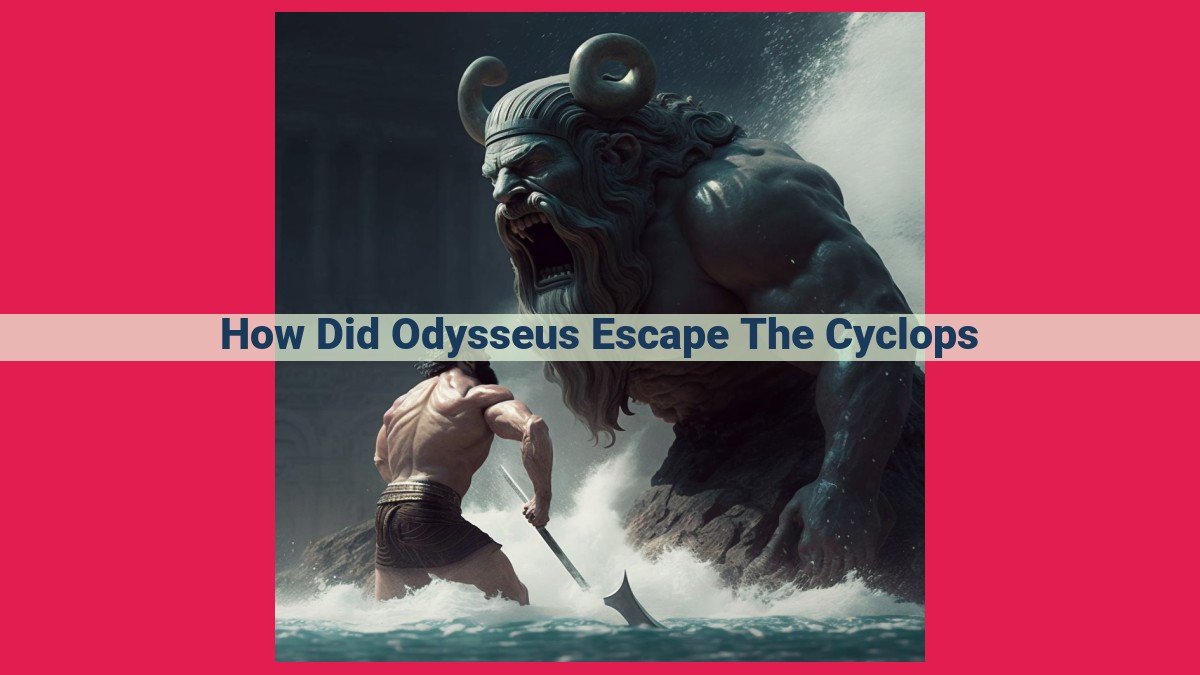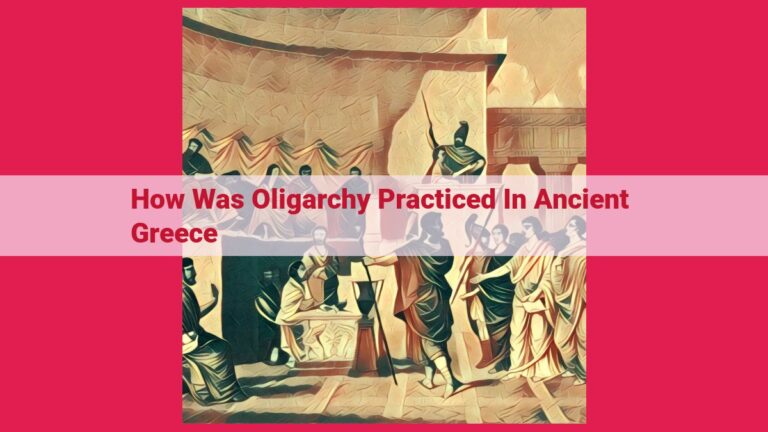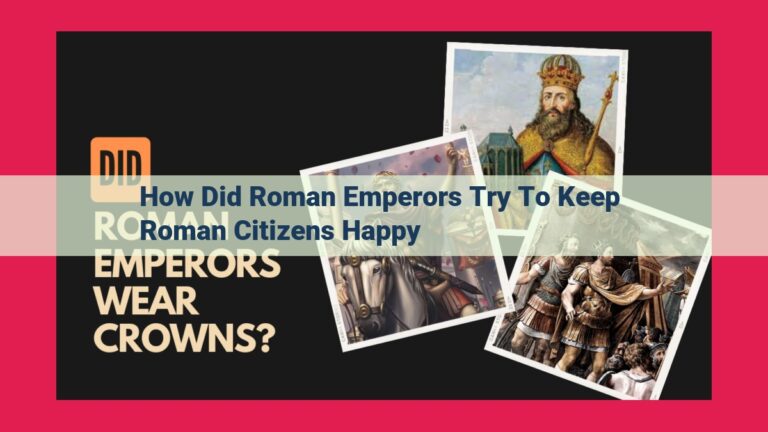Odysseus’s Cunning And Resilience: Triumphing Over The Cyclops Polyphemus

Odysseus’s encounter with the Cyclops Polyphemus is a testament to his cunning and resilience. After Polyphemus traps his crew, Odysseus intoxicates the giant with wine. Using his sharpened stake, he blinds Polyphemus and escapes under the guise of sheep. By ingeniously exploiting wine’s effects, crafting a weapon, and executing a clever deception, Odysseus proves his quick thinking and ability to overcome formidable obstacles.
Polyphemus: The Formidable Cyclops
- Introduce Polyphemus and his monstrous characteristics.
- Describe how Odysseus’s crew becomes trapped by Polyphemus.
Polyphemus: The Formidable Cyclops
In the realm of ancient Greek mythology, Polyphemus stands as a formidable creature of legend. This one-eyed giant, a formidable member of the _Cyclops race, is forever etched in the tapestry of Homer’s Odyssey.
Polyphemus resided in a secluded cave on the island of Sicily. His colossal stature, uncouth appearance, and unyielding strength made him a feared figure. His gargantuan appetite for human flesh added to his terror, leaving travelers and sailors quaking in their boots.
One fateful day, Odysseus, the cunning King of Ithaca, and his loyal crew found themselves stranded on Polyphemus’s island. Curiosity got the better of them, and they ventured into the Cyclops’s cave, hoping to find shelter and sustenance.
To their dismay, Polyphemus arrived at his cave, blocking the entrance with a massive boulder. Hungry and bloodthirsty, he trapped Odysseus and his men inside. Over the course of several days, Polyphemus devoured two of the crew each night, leaving Odysseus and his remaining companions at his monstrous mercy.
Intoxication and Sleep: The Power of Wine
In Odysseus’s perilous journey, he encountered the formidable Cyclops Polyphemus, a monstrous creature whose insatiable appetite extended to human flesh. Blinded by his pride, Polyphemus imprisons Odysseus and his crew within his desolate cave. Their hopes dwindle, and escape seems impossible until Odysseus’ cunning mind devises a daring plan.
Recognizing Polyphemus’ weakness for wine, Odysseus exploits this flaw to his advantage. With his crew’s assistance, Odysseus offers the monstrous Cyclops a potent draught of rich, fermented grape juice. The allure of the intoxicating beverage proves irresistible to Polyphemus, and he eagerly consumes one wineskin after another. As the wine’s effects take hold, Polyphemus’ senses dull, and his eyelids grow heavy.
This moment of vulnerability becomes Odysseus’ opportunity to strike. Seizing a sharpened stake, he approaches the slumbering Cyclops and with a swift and precise thrust, blinds Polyphemus in one eye. The cave reverberates with the monster’s roar of agony as darkness descends upon his vision. The blinding of Polyphemus not only cripples the creature but also paves the way for Odysseus and his crew to escape the perilous confines of the cave.
Odysseus’s Ingenuity: Crafting the Sharpened Stake
In Homer’s epic tale, the Odyssey, Odysseus and his crew embark on a perilous journey to return home. Along their path, they encounter Polyphemus, a formidable Cyclops who imprisons them within his monstrous cave.
Determined to escape their gruesome fate, Odysseus, renowned for his intelligence and cunning, devises an ingenious plan. He realizes that his crew must blind Polyphemus to make their escape.
With no tools or weapons at their disposal, Odysseus turns his keen mind to the task. He observes his surroundings and notices a large, olive tree growing at the entrance of the cave. Its sturdy branches inspire an idea. Working throughout the night, Odysseus carefully sharpens a large branch into a formidable stake.
The stake becomes a crucial instrument in their plan to escape. Odysseus knows that the blinding of Polyphemus will render him temporarily helpless, allowing his crew to slip away unnoticed. The sharpened stake represents Odysseus’s ingenuity, his ability to adapt and overcome challenges with resourcefulness.
As the tale unfolds, Odysseus puts his plan into action, leading to their daring escape and victory over the monstrous Cyclops. The sharpened stake symbolizes the indomitable spirit of Odysseus, his willingness to confront danger and his unwavering determination to return home.
Blinded Polyphemus: Odysseus’s Cunning Triumph
As the Cyclops, Polyphemus, slumbered deeply, his cavernous abode echoing with the sound of his thunderous snores, Odysseus and his intrepid crew seized their moment. With a sharpened stake forged from the very wood of the Cyclops’s own pen, they embarked on a daring plan to escape their monstrous captor.
Slowly and stealthily, Odysseus approached the slumbering giant, his every movement calculated. He guided the razor-sharp stake into the single, gaping eye of Polyphemus, piercing deep into the creature’s monstrous skull. A gut-wrenching roar filled the cavern as the Cyclops awoke, writhing in agony and darkness.
The blinding of Polyphemus proved to be a pivotal moment in Odysseus’s escape plan. Now deprived of sight, the Cyclops was rendered helpless and disoriented. He stumbled and flailed about his cavern, utterly bewildered. This created the perfect opportunity for Odysseus and his crew to make their getaway.
With the blinded Polyphemus no longer posing a threat, Odysseus swiftly implemented his next plan. He and his men disguised themselves beneath the woolly bellies of the Cyclops’s sheep, cleverly fooling the creature as he fumbled his way towards the cavern’s entrance. As dawn broke, Odysseus and his crew made their daring escape, slipping past the unsuspecting Polyphemus and finally breaking free from his monstrous grasp.
Odysseus’s Masterful Deception: Escape Under Sheep
In the face of the formidable Cyclops Polyphemus, Odysseus, renowned for his cunning and resourcefulness, devised an ingenious plan to outsmart his monstrous captor and secure the escape of his crew.
With Polyphemus slumbering deeply after succumbing to the potency of Odysseus’s wine, Odysseus and his men set about their meticulous scheme. Using sharpened sticks, they stealthily blinded the sleeping giant, rendering him helpless and unable to pursue them.
Their escape was far from over. Odysseus knew Polyphemus’s colossal size and monstrous strength would enable him to crush them underfoot if he discovered their presence. Thus, Odysseus formulated a daring plan to conceal themselves under the thick pelts of Polyphemus’s copious sheep.
As the first rays of dawn illuminated the cavern, Polyphemus arose, his sense of smell now his primary guide. With thunderous steps, he approached the entrance, feeling each sheep’s belly with his enormous hands to ascertain if any humans were hidden beneath.
Odysseus, ever mindful of his cunning, meticulously tied himself and his men to the undersides of the sheep, their bodies suspended inches above the ground. As Polyphemus’s massive hands grazed their leather sandals, the men remained motionless, their hearts pounding with trepidation.
Stealthily, they slipped out from under the herd as Polyphemus, unsuspecting, released the sheep to graze on the verdant slopes outside. Odysseus and his men, concealed and undetected, escaped the confines of the cavern and embarked on their perilous journey back to their ship, their cunning and determination triumphant.





